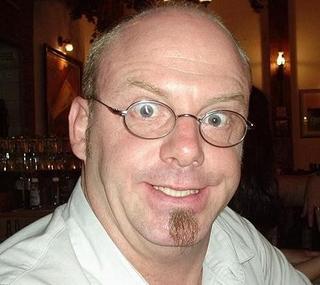NOUN PHRASE
It is very common for nouns to have supporting elements, such as determiners and/or premodifiers (adjectives) and/or postmodifiers (adjectives, adjective phrases or adjective clauses). When this occurs, the group of words is known as a noun phrase.
e.g. THREE INTRIGUING FELLOWS SWEET-TALKED THE MANAGER INTO A FREE LUNCH.
- "Three intriguing fellows" is a noun phrase made up of a determiner "three", a premodifier "intriguing" and a noun "fellows'. The noun "fellows" is the nucleus (head) of the phrase. See below:
Three intriguing fellows = noun phrase
Three (determiner); intriguing (adjective - premodifier); fellows (nucleus)
- "the manager" is a noun phrase made up of a determiner "the" and a noun "manager". The noun "manager" is the nucleus (head) of the phrase.
- "a free lunch" is a noun phrase made up of a determiner "a", a premodifier "free" and a noun "lunch'. The noun "lunch" is the nucleus (head) of the phrase.
e.g. THE TRUNK OF THE CAR WAS DESTROYED IN THE CRASH.
- "The trunk of the car" is a noun phrase made up of a determiner "the", a noun "trunk" and a postmodifier "of the car" (prepositional phrase working as and adjective phrase). The noun "trunk" is the nucleus (head) of the phrase.
- "the crash" is a noun phrase made up of a determiner "the" and a noun "crash". The noun "crash" is the nucleus (head) of the phrase.
e.g. SOMEBODY CLEVER, QUICK AND ON THE BALL MUST HAVE SNEAKED INTO THE ROOM OVERNIGHT.
- "Somebody clever, quick and on the ball" is a noun phrase made up of a noun "somebody" and the postmodifiers "clever", "quick" and "on the ball". The noun "somebody" is the nucleus (head) of the phrase.
e.g. THE BOOKSHELVES (THAT) WE INSTALLED YESTERDAY FELL DOWN.
- "The bookshelves (that) we installed yesterday" is a noun phrase made up of a determiner "the", a noun "bookshelves" and an adjective clause "(that) we installed yesterday". The noun "bookshelves" is the nucleus (head) of the phrase. See below:
The bookshelves (that) we installed yesterday = noun phrase
The (determiner); bookshelves (nucleus); (that) we installed yesterday (adjective clause)
NB: The adjective clause "(that) we installed yesterday" is not the nucleus of the subject because it is dependent (subordinate) to the noun phrase "The bookshelves".


0 Comments:
Post a Comment
<< Home